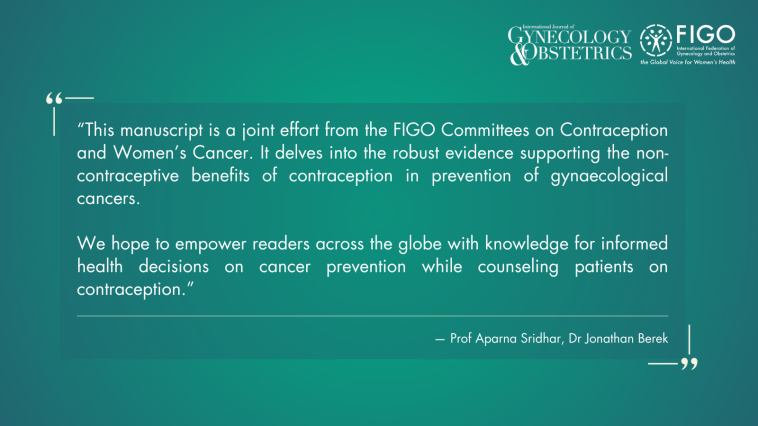Exploring the protective effect of contraceptive methods against gynaecological cancer

FIGO and IJGO are pleased to announce the publication of “Contraceptive Strategies for Reducing Reproductive Cancer Risk.
The FIGO Committee on Contraception and the Committee on Women’s Cancer have released a comprehensive clinical guidance examining the vital role that various contraceptive methods can play in reducing the risk of several major gynaecological cancers affecting women globally.
The in-depth guidance provides an overview of endometrial cancer, ovarian and primary peritoneal cancer, cervical cancer and gestational trophoblastic neoplasia. It analyses the latest evidence on how long-acting reversible contraceptives, injectable methods, combined oral contraceptives and progestin-only pills can lower the incidence of these cancers.
Key findings:
Long-acting reversible contraceptives like IUDs reduce endometrial and ovarian cancer risk, with the levonorgestrel IUD showing potential to manage precancerous conditions.
Injectable contraceptives like DMPA demonstrate protection against endometrial cancer on par with combined oral contraceptives.
Combined oral contraceptives can cut ovarian cancer risk by up to 80% with long-term use and reduce endometrial cancer risk by 50% after just one year of use.
For cervical cancer, evidence suggests increased risk with long-term combined oral contraceptive use over five years, but conflicting data on injectables.
The publication emphasises shared decision-making between providers and patients when selecting contraceptive methods. It also underscores the importance of comprehensive counseling to ensure patients understand these vital non-contraceptive cancer prevention benefits.
“This will be an open access article and we hope to empower readers across the globe with knowledge for informed health decisions on cancer prevention while counseling patients on contraception. We thank our co-authors as well as our committee members for their contribution to this manuscript.”
— Prof Aparna Sridhar, Dr Jonathan Berek